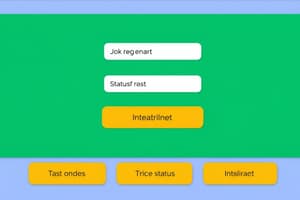Podcast
Questions and Answers
Quel est l'objectif principal de la gestion du temps?
Quel est l'objectif principal de la gestion du temps?
- Travailler plus intelligemment (correct)
- Travailler plus longtemps
- Travailler sans planification
- Travailler sans objectifs clairs
Quelle méthode peut être utilisée pour la gestion du temps selon le texte?
Quelle méthode peut être utilisée pour la gestion du temps selon le texte?
- Laisser les distractions vous envahir
- Ne pas définir d'objectifs clairs
- La technique Pomodoro (correct)
- Ne pas établir de priorités
Que favorise une collaboration efficace?
Que favorise une collaboration efficace?
- Manque de communication
- Travailler en solo uniquement
- Confiance et respect (correct)
- Manque de coordination
Qu'est-ce que l'allocation des ressources dans un projet implique principalement?
Qu'est-ce que l'allocation des ressources dans un projet implique principalement?
Quel outil peut faciliter la collaboration entre les membres d'une équipe?
Quel outil peut faciliter la collaboration entre les membres d'une équipe?
Quel logiciel est mentionné comme un outil complet de gestion de projet qui inclut la gestion des tâches, la gestion du temps, la collaboration et l'allocation des ressources?
Quel logiciel est mentionné comme un outil complet de gestion de projet qui inclut la gestion des tâches, la gestion du temps, la collaboration et l'allocation des ressources?
Quel processus de gestion de projet implique le suivi et la documentation de la progression des tâches dans un projet?
Quel processus de gestion de projet implique le suivi et la documentation de la progression des tâches dans un projet?
Quelle étape de la gestion de projet implique l'identification de ce qui doit être fait, comment cela sera fait et qui le fera?
Quelle étape de la gestion de projet implique l'identification de ce qui doit être fait, comment cela sera fait et qui le fera?
Quelle étape du processus de gestion de projet implique le suivi du projet par rapport au plan du projet?
Quelle étape du processus de gestion de projet implique le suivi du projet par rapport au plan du projet?
Quel élément de la gestion de projet consiste à définir les rôles, les responsabilités et à gérer les ressources telles que l'équipement, la technologie et les budgets?
Quel élément de la gestion de projet consiste à définir les rôles, les responsabilités et à gérer les ressources telles que l'équipement, la technologie et les budgets?
Quelle phase finale du projet implique la fin de tout le travail du projet de manière formelle?
Quelle phase finale du projet implique la fin de tout le travail du projet de manière formelle?
Quel élément de la gestion de projet concerne le fait de guider toute l'équipe du projet à travers ses différentes étapes?
Quel élément de la gestion de projet concerne le fait de guider toute l'équipe du projet à travers ses différentes étapes?
Flashcards are hidden until you start studying
Study Notes
Q10: Project Management, Task Tracking, Time Management, Collaboration, Resource Allocation
Project management involves planning, organizing, coordinating, directing, monitoring, controlling, and closing the work of a team to achieve specific goals and objectives within a given timeframe. Effective project management requires several key elements:
Project Management
- Planning: This is where you identify what needs to be done, how it will be done, and who will do it. It's all about setting out your strategy for delivering your project successfully.
- Organising: This includes everything from defining roles and responsibilities to managing resources such as equipment, technology, budgets and people.
- Leading: As a project manager, one has to lead their entire project team through its stages.
- Monitoring and Controlling: This process involves tracking the project against the project plan, and making any necessary changes to the project plan to keep the project on track.
- Closing: This is the final process of the project where all the work of the project is finished, and the project is formally closed.
Task Tracking
Task tracking is the process of monitoring and documenting the progress of tasks in a project. It helps project managers and team members to understand what needs to be done, what has been done, and what still needs to be done. Task tracking can be done using various tools and methods, such as spreadsheets, task management software, or even pen and paper. The key is to find a method that works best for your team and stick to it.
Time Management
Time management is the process of organizing and planning how to divide your time between specific activities. Good time management enables you to work smarter – not harder – so that you get more done in less time even when time is tight and pressures are high. It involves setting clear goals, prioritizing tasks, allocating time effectively, avoiding distractions, and dealing with unexpected problems. There are various time management techniques that can be used, such as the Pomodoro Technique, time blocking, and the Eisenhower Matrix.
Collaboration
Collaboration is the process of working together with others to achieve a shared goal. It involves communication, coordination, and cooperation among team members. Effective collaboration requires trust, respect, and open communication. It can be facilitated through various tools, such as project management software, collaboration platforms, and communication tools.
Resource Allocation
Resource allocation is the process of distributing resources, such as people, equipment, or money, to different areas of a project. It involves making decisions about which tasks to prioritize and which resources to allocate to them. Effective resource allocation requires careful planning and coordination, as well as an understanding of the project's goals and constraints. It can be facilitated through various tools, such as Gantt charts, resource management software, and budget tracking tools.
In conclusion, Q10 is a comprehensive project management tool that includes features for task tracking, time management, collaboration, and resource allocation. It can help project managers and teams to plan, organize, coordinate, direct, monitor, control, and close projects more effectively. By using Q10, teams can improve their project management skills, increase productivity, and achieve their goals more efficiently.
Studying That Suits You
Use AI to generate personalized quizzes and flashcards to suit your learning preferences.




